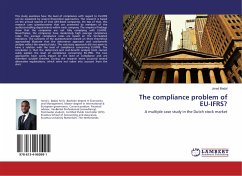This study examines how the level of compliance with regard to EU-IFRS can be explained by several theoretical approaches. The research is based on the annual reports of nine AEX-listed companies. On top of that, this research uses questionnaires that are answered by members of the audit/controlling departments within each company. The empirical findings show that the companies are not fully complying with EU-IFRS. Nevertheless, the companies have moderately high average compliance rates. The average compliance rates are based on the formulated indicators. The outcome of the questionnaires (based on three theoretical approaches) illustrate that the deterrence approach and cost-benefit analysis reflect the empirical data. The voluntary approach did not seem to have a relation with the level of compliance concerning EU-IFRS. The conclusion is that the deterrence and cost-benefit analysis both cannot solely explain the level of compliance concerning EU-IFRS. The two approaches have surely impact on the level of compliance and are therefore suitable theories. During the research there occurred several alternative explanations, which were not taken into account from the start.
Bitte wählen Sie Ihr Anliegen aus.
Rechnungen
Retourenschein anfordern
Bestellstatus
Storno








